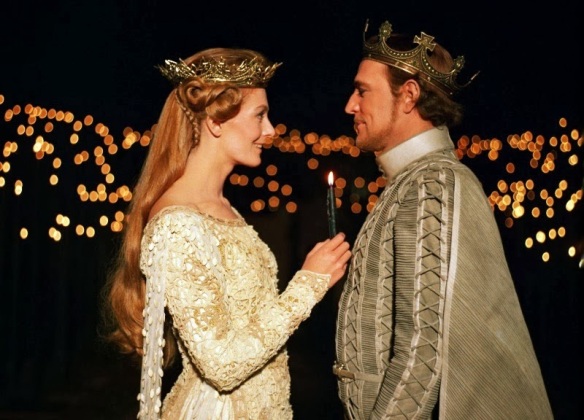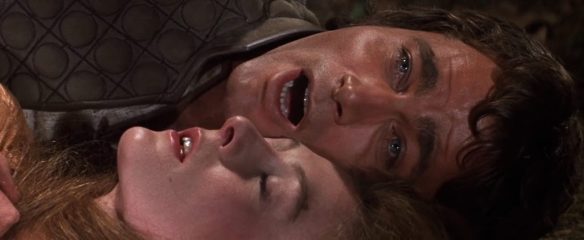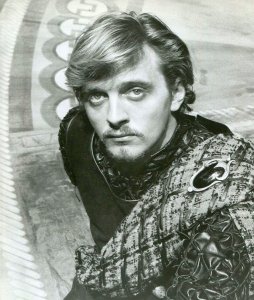It’s no secret that the Hollywood Comet loves musicals.
In 2010, I revealed I had seen 400 movie musicals over the course of eight years. Now that number is over 500. To celebrate and share this musical love, here is my weekly feature about musicals.
 This week’s musical:
This week’s musical:
Camelot (1967) – Musical #235
Studio:
Warner Brothers
Director:
Joshua Logan
Starring:
Richard Harris, Vanessa Redgrave, Franco Nero, David Hemmings, Estelle Winwood, Lionel Jeffries, Laurence Naismith,
Gary Marshal
Plot:
The story of King Arthur (Harris) and his marriage to Queen Guinevere (Redgrave). King Arthur’s philosophy is “Not might ‘makes’ right, but might ‘for’ right” so he creates the Knights of the Round Table of noble knights to help carry out a rudimentary idea of democracy and England’s unification. One of the knights is Sir Lancelot (Nero), who the Queen grows fond of, which causes problems with the other knights. Causing further problems is the arrival of Arthur’s illegitimate son Mordred (Hemmings).
Trivia:
- The original 1960 Broadway cast starred Richard Burton, Julie Andrews, Robert Goulet, Roddy McDowall, Robert Coote
- For the film, Jack Warner and composer Alan Jay Lerner pursued Richard Burton, who priced himself out of the role. Richard Harris campaigned for four months for the role, which included sending Joshua Logan handwritten letters and telegrams that said “Only Harris for Arthur” and “Harris Works Cheaper.” Logan finally got tired of it and agreed to give Harris a screen test, according to Hellraisers: The Life and Inebriated Times of Richard Burton, Richard Harris, Peter O’Toole, and Oliver Reed by Robert Sellers
- At the time of casting, Laurence Harvey was playing King Arthur in the London stage version of “Camelot” and hoped to get a role in the film. Harris campaigning for and winning the role cost them their friendship, according to Sellers’ book.
- Harris didn’t behave well during the filming, even punching David Hemmings at a party, and Vanessa Redgrave said she would never act with Harris again (and didn’t), according to Sellers’ book.
- Franco Nero and Vanessa Redgrave met on the set of this film, which began a lengthy relationship. They were married in 2006.
- Richard Harris did not like Julie Andrews and would not have done the film had she been cast.
- Franco Nero was dubbed by Gene Merlino
Notable Songs:
-“I Wonder What the King is Doing Tonight” performed by Richard Harris
-“Camelot” performed by Richard Harris
-“What do the Simple Folks Do” performed by Richard Harris and Vanessa Redgrave
My review:
In 2003, I started my “Musical List” and sought out every musical I could get my hands on. In the summer, I would head to the library and check out the musicals I hadn’t seen. “Camelot” was one of those movies. I was so excited to watch it. It was a summer night, my dad was out of town on business and my mom and I sat up to watch it. And at the time I was extremely disappointed.
When I was preparing to revisit “Camelot” for the first time in 14 years, I wasn’t looking forward to it. In fact, I was dreading it, but I wanted to review it for Musical Monday in coordination with Turner Classic Movie’s Vanessa Redgrave day for Summer Under the Stars 2017 so I rented it on Amazon.

Vanessa Redgrave and Richard Harris in the wedding scene in “Camelot.” Redgrave’s wedding dress cost $12,000
And while I remember disliking the film many years ago, I didn’t dislike it as much this time. The film begins happily with upbeat music and humorous scenes. Richard Harris’s King Arthur is exuberant and animated in his singing and Vanessa Redgrave — with her magnificent long red hair — is lovingly at his side. When we first meet Franco Nero as Sir Lancelot, his song “C’est Moi” (dubbed by Gene Merlino) is quite humorous with lyrics like:
But where in the world
Is there in the world
A man so extraordinaire?
C’est moi! C’est moi, I’m forced to admit.
The first half of the movie is filled with happiness, jubilant singing and even swinging, gathering flowers and singing about the month of May.
And then half way through the film we make a hard left turn. I feel most of you know the story of King Arthur and Camelot so I’m not spoiling anything to say this film isn’t entirely happy.
(SPOILERS) The two that King Arthur loves most betray him through infidelity, which makes his happy and strong kingdom fall. I hate this. It’s not like King Arthur’s character is a terrible person. He is loving and wants to do what’s right. I’m not sure if I’m supposed to sympathize with Lancelot and Guinevere, but I don’t. While Franco Nero as Lancelot is very handsome and kind, I could only think about Richard Harris as King Arthur and how badly I felt for him (and how handsome he is). During the song “If Ever I Would Leave You” (which features a montage of Lancelot and Guinevere’s love, complete with dramatic hair blowing), I was just shaking my head, irritated with their actions. The whole situation makes me angry because most of the problems that follow are a direct result to their indiscretions. (SPOILERS ENDED)
I believe the reason I didn’t initially like the movie back in 2003 is this hard left turn that leads to so much unhappiness and destruction. Now don’t get me wrong, I understand not all movies are happy. Heck, my favorite movie is “West Side Story” which brings me to tears for nearly the last 30 minutes! The darkness and unhappiness in “Camelot” just seems so selfish.
And New York Times film critic Bosley Crowther agrees that this turn is what hurts this movie, according to an Oct. 27, 1967, review:
“Likewise, when both of them are taking the measure of the new boy, Lancelot, upon his precipitate arrival, full of boastful and pious conceits, it appears to be headed in the direction of an urbane, satiric spoof, especially when they all engage quite nicely in the tra-la-laing of “The Lusty Month of May.”
But the moment that Lancelot bends gravely over the knight he has speared in the lists and urges life back into his body, to the amazement of all, especially Guinevere, the direction and character of the picture take a perceptible turn. From here on it is rather heavy going around the course of triangular romance…”
While I won’t say “Camelot” is my favorite musical, I did like it better this viewing. The cinematography by Richard H. Kline was beautiful and vibrant, and the music is wonderful (I had “Camelot” in my head for days. In fact I’m still humming it as I write).
But the saving grace of this movie is Richard Harris’s magnificent performance. He is fantastic as King Arthur. His singing is charming and he looks very handsome, but most of all he’s extremely effective and convincing in the role. When his character is exhilarated, you feel the same. And when he’s morose, knowing that he was betrayed, you feel depressed too.
Richard Harris also does an excellent job of breaking your heart. Plain and simple, he’s excellent. “Camelot” is certainly the peak of his career. I know some will say “What about Harry Potter?!” (which, by the way, he made because his granddaughter threatened him if he didn’t), but Richard Harris wasn’t the star of Harry Potter and “Camelot” was all his.
As painted in Robert Sellers’ book “Hellraisers,” Richard Harris was extremely difficult to work, and “Camelot” was no exception (even though he went to great lengths to get the role). But no matter what occurred off screen (drunkenness, punching David Hemmings, etc) it doesn’t come across on screen.
As for the rest of the cast, they do a great job as well.
When I read who was in the original Broadway cast, I thought about how they would have been amazing on screen – Richard Burton as King Arthur, Julie Andrews as Guinevere, Robert Goulet as Lancelot, and Roddy McDowell as Mordred. Often times, the stage cast isn’t translated to the screen version because they aren’t well known, but by 1967, all of these actors were established stars. However, while I would have loved to see them all together in this film, the cast of the film works well.
For most film goers in 1967, I’m not sure how they would have felt about Julie Andrews, who knew her as sweet Mary Poppins and Maria Von Trappe, as the cheating Guinevere. Somehow Vanessa Redgrave seems to fit better. Director Joshua Logan apparently had some problems with Vanessa Redgrave as well, but not to the lengths of Richard Harris. Redgrave had artistic ideas like wearing the same costume the whole film or singing lines of “Take Me to the Fair” in French as a joke that Logan had to shoot down. These artistic differences led to lengthy arguments, according to Vanessa: The Life of Vanessa Redgrave by Dan Callahan.
Franco Nero also is extremely dashing as Lancelot. David Hemmings does a great job of playing a weaselly Mordred. Though admittedly, I really would have loved to see Roddy McDowall in that role. The wonderful Estelle Winwood also has a small role.
Of course, as most know, one point of interest of “Camelot” is that it brought Vanessa Redgrave and Franco Nero together, who started a lengthy relationship, had a child and eventually were married in 2006. They are still together today. It’s an odd art-imitates-life aspect of this film.
I was glad revisiting “Camelot” slightly changed my opinion of this film. I can’t say I loved it, but I liked it a lot better and don’t think of it with so much disdain. Beware if you are going in to watch it that it is THREE HOURS long, which seems excessive. Due to my schedule of getting home and when I head to bed, I had to split my viewing into two nights. Not ideal, but it made the film extremely digestible. Otherwise, I do think I would have gotten rather bored during some of the scenes.
And the main reason I liked this film more was because of Richard Harris. “Camelot” is his film.
Check out the Comet Over Hollywood Facebook page, follow on Twitter at @HollywoodComet or e-mail at cometoverhollywood@gmail.com




For some reason, I am always disappointed in a film directed by Josh Logan!
In Camelot, I felt the camera had waaay too many closeups of Richard Harris who seemed terribly miscast in the role of Arthur… The film never establishes any cinematic freedom from the stage play and remained very static (uncinematic) to me. I do like the soundtrack, tho!
LikeLike
I was just a kid when I saw it and loved it. I didn’t know the story of Lancelot and Guinevere at the time, so I hated Lancelot and Guinevere for doing that. As I got older, I learned this was a significant part of the King Arthur legend, but I always hate it, no matter the version.
LikeLike